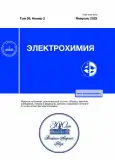Том 59, № 2 (2023)
Электрофоретическое осаждение наноразмерных частиц кобальтата лития на поверхности металлов и электропроводящей оксидной керамики
Аннотация
В статье представлены результаты исследования электрофоретического осаждения наноразмерных частиц LiCoO2, синтезированных в расплавах LiCl–CoCl2, на поверхностях никелевой фольги, меди, хром-кобальтового сплава и платиновой сетки в водных растворах хлорида лития при комнатной температуре и на поверхности электронопроводящей оксидной керамики La0.6Sr0.4MnO3 в хлоридном расплаве при температуре около 700°C. Методами колебательной спектроскопии, рентгеновской фотоэлектронной спектроскопии, эллипсометрии и сканирующей электронной микроскопии выявлены особенности химического состава, структуры и морфологии полученных осадков.
 81-91
81-91


Сравнительное изучение биокаталитического окисления некоторых органических субстратов с помощью микроорганизмов Shewanella xiamenensis и Escherichia coli на медиаторных и безмедиаторных биоанодах
Аннотация
В работе проведена сравнительная оценка эффективности микроорганизмов Shewanella xiamenensis и Escherichia coli, используемых в качестве биокатализатора в процессе биоэлектрохимического окисления различных субстратов в нейтральных средах на безмедиаторном и медиаторном биоанодах. Показано, что скорость биоэлектрохимического окисления исследуемых органических субстратов (лимонная кислота, глюкоза, сахароза) с помощью клеток S. xiamenensis не зависит от концентрации введенного в систему медиатора (метиленового синего) – перенос электронов от клеток на электрод осуществляется в результате прямого контакта клеток с поверхностью электрода. Сравнительный кинетический анализ показал, что клетки S. xiamenensis являются менее эффективным биологическим катализатором процесса окисления глюкозы по сравнению с микроорганизмом E. coli (в присутствии медиатора). Определены кинетические характеристики реакции окисления глюкозы в системе “медиатор–субстрат–клетки E. coli”. Установлено, что порядок реакции окисления по глюкозе на аноде равен единице, величина константы скорости этой реакции составляет 0.0214 мин–1, время полупревращения глюкозы – 33 мин. Показано, что исследуемая модельная система позволяет понизить концентрацию глюкозы в рабочем растворе до значения фонового тока, что свидетельствует о почти полной очистке раствора от органического субстрата. Показано, что при решении практических задач для повышения эффективности очистки стоков от органических веществ с помощью безмедиаторных биоанодов необходимо вести поиск новых клеток, в том числе и других клеток рода Shewanella, с обязательной иммобилизацией клеток на поверхности электрода с целью повышения электрического контакта.
 92-100
92-100


Влияние плотности тока на удельные характеристики отрицательных электродов для литий-ионных аккумуляторов на основе термообработанного нефтяного кокса
Аннотация
Приводятся результаты сопоставительных исследований влияния плотности тока на величины среднего разрядного напряжения и удельной разрядной емкости углеродных электродов на основе термически обработанного нефтяного кокса и графита. Установлено, что углерод, полученный термообработкой нефтяного кокса, обладает лучшими кинетическими характеристиками, чем графит. Увеличение плотности тока с 0.2 мА/см2 (36 мА/г) до 2 мА/см2 (364 мА/г) приводит к уменьшению разрядной емкости термообработанного нефтяного кокса на 26%, а графита – на 93%. При восстановлении плотности тока до 0.2 мА/см2 разрядная емкость углеродных электродов восстанавливается до начального значения. Исследования показали, что увеличение плотности тока также приводит к увеличению среднего разрядного напряжения литий-углеродных ячеек. Так при увеличении плотности тока с 0.2 до 2 мА/см2 среднее разрядное напряжение литий-углеродных ячеек с активным компонентом углеродного электрода ТНК увеличивается с 0.39 до 0.62 В, а для графита – с 0.14 до 0.35 В.
 101-110
101-110


Влияние ионов Ga3+ и In3+ на анодное растворение Al в растворах КОН в этаноле
Аннотация
Рассмотрен процесс анодного растворения Al в растворах КОН в этаноле. Показано, что добавки соединений галлия и индия в 2 М раствор КОН в 96% этанола приводят к резкому увеличению тока анодного растворения Al вблизи потенциала разомкнутой цепи и его сдвигу на 300 мВ в сторону отрицательных значений. Разрядные гальваностатические кривые в растворах с добавками соединений галлия и индия демонстрируют плоское плато разряда при величинах плотности тока вплоть до 4 мА/см2. Измерена скорость выделения водорода в ряде растворов КОН в этаноле.
 111-116
111-116












